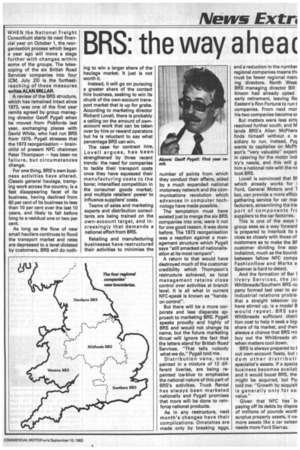BRS: the way aheac
Page 23

If you've noticed an error in this article please click here to report it so we can fix it.
WREN the National Freight Consortium starts its next financial year on October 1, the reorganisation process which began a year ago will move a stage further with changes within some of the groups. The telescoping of the six British Road Services companies into four (CM, July 23) is the furthestreaching of these measures writes ALAN MILLAR.
A review of the BRS structure, which has remained intact since 1973, was one of the first year remits agreed by group managing director Geoff Pygall when he moved from Pickfords last year, exchanging places with David White, who had run BRS from 1975. Pygall stresses that the 1973 reorganisation — brainchild of present NFC chairman Peter Thompson — has been no failure, but circumstances change.
For one thing, BRS's own business activities have altered. Classic general haulage, tramping work across the country, is a fast disappearing facet of its business, having declined from 60 per cent of its business to less than 10 per cent over the last 10 years, and likely to fall before long to a residual one or two per cent.
As long as the flow of new small hauliers continues to flood the transport market and rates are depressed to a level dictated by customers, BRS will do noth ing to win a larger share of the haulage market. It just is not worth it.
Instead, it will go on pursuing a greater share of the contact hire business, seeking to win its chunk of the own-account transport market that is up for grabs. According to marketing director Richard Lovell, there is probably a ceiling on the amount of-ownaccount work that can be taken over by hire or reward operators but he is reluctant to say what percentage BRS can win.
The case for contract hire, Lovell argues, has been strengthened by three recent trends: the need for companies to tackle their transport costs once they have squeezed their manufacturing costs to the bone; intensified competition in the consumer goods market; and multiple retailers' power to influence suppliers' costs.
Teams of sales and marketing experts and distribution consultants are being trained on the own-account target, and increasingly that demands a national effort from BRS.
Retailing and manufacturing businesses have restructured their activities to minimise the number of points from which they conduct their affairs, aided by a much expanded national motorway network and the communications revolution which advances in computer technology have made possible.
The temptation must have existed just to merge the six BRS companies into one, were it not for one good reason. It was done before. The 1973 reorganisation was a reaction against a management structure which Pygall says "still smacked of nationalisation at its most rampant".
A return to that would have destroyed much of the customer credibility which Thompson's restructure achieved, as local management retains close control over activities at branch level. It is all what in current NFC-speak is known as "handson control".
But there will be a more corporate and less disparate approach to marketing BRS. Pygall speaks proudly and highly of BRS and would not change its name, but the future marketing thrust will ignore the fact that the letters stand for British Road Services. "That tells nobody what we do," Pygall told me.
Distribution vans, once painted in a mixture of 12 different liveries, are being repainted ice-blue to emphasise the national nature of this part of BRS's activities. Truck Rental has always been marketed nationally and Pygall promises that more will be done to reinforce national products.
As in any restructure, next month's changes have their complications. Omelettes are made only by breaking eggs, and a reduction in the number regional companies means thE must be fewer regional manll ing directors. North West' BRS managing director Bill kinson had already opted early retirement, leaving No Eastern's Ron Fortune to run t companies. From next mor his two companies become or But matters were less sin,' resolved further south, and M lands BRS's Allan McPhers finds himself without a a sidiary to run. Instead, Pyg wants to capitalise on McPh son's "very valuable" expert in catering for the motor indi try's needs, and this will g him a national role with the ne look BRS.
Lovell is convinced that BI which already works for I Ford, General Motors and 1 bot, can provide a more efficiE gathering service for car mar facturers, streamlining the trai port of components frc suppliers to the car factories.
This is one of the ways 1 group sees as a way forward is prepared to interlock its s vices so closely with those of customers as to make the BF customer dividing line app, indistinct, much as the boundi between fellow NFC compa Fashionflow and Marks a Spencer is hard to detect.
And the formation of Bar I livery Services, the joi Whitbreads/Southern BRS co pany formed last year to avi industrial relations problei that a straight takeover col have stirred up, is a model B would repeat. BRS say Whitbreads sufficient distril tion cost to help it seek a big! share of its market, and there always a chance that BRS mii buy out the Whitbreads sh when matters cool down.
BRS is always prepared to t out own-account fleets, but dom other distributi specialist's assets. If a specia business becomes availat and it would boost BRS, the might be acquired, but Pyc told me: "Growth by acquisit is generally only for as: value."
Given that NFC has bi paying off its debts by dispos of millions of pounds worth surplus property assets, it ne, more assets like a car salesn needs more Ford Sierras.




























































































































